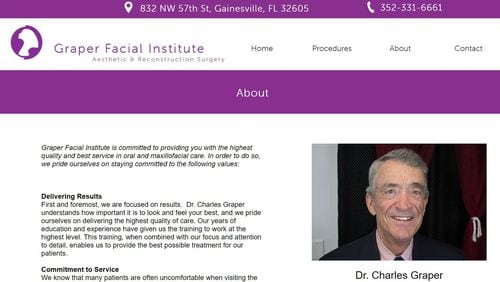The Brantley County woman went in to have three teeth pulled.
After a bad reaction to sedation, she experienced a deadly medical condition that stopped the oxygen from reaching her blood and lungs. She died in the hospital nine days later.
To hear her dentist tell it, he tried to save her life.
The Georgia Board of Dentistry said his care led to her death and that of another patient back in 2015.
Earlier this year, the board used its oversight power to revoke the license of that dentist, 74-year-old Dr. Charles Graper.
The harsh punishment was a rare one by a state regulator that closes with no action the vast majority of the complaints it receives about substandard care, unsanitary conditions or malpractice, an Atlanta Journal-Constitution review found.
In Graper’s case, it was only the second time in five years that the board revoked a dental license based on patient care issues, the board’s list of monthly public orders shows. In two other occasions, dentists lost their licenses for reasons that had nothing to do with the quality of care they provided.
The small number of revocations is not surprising, said Jamie Court, president of Consumer Watchdog in Los Angeles, a patient rights organization that brings to light gaps in oversight of state professional licensing boards for doctors, dentists and other healthcare professionals. Georgia’s dentistry board has a dismal record when it comes to disciplining dentists who do harm to patients, he said.
At less than one license revocation per year, on average, against more than 5,600 dentists, that is almost “like not having any enforcement at all,” Court said. “This is a really troubling low number of enforcement actions.
“This is a really cozy backdoor club of professionals who are very reluctant to take the word of a patient over the word of a dentist,” Court said. “It just shows the board is more concerned about getting referrals from members of the profession than protecting the public.”
LEARN MORE: Click on the image below to see the original document
The dental board had opportunities to shut down other dangerous dentists. But it’s hard to learn the details because the board keeps complaints secret. And when dentists voluntary surrender their licenses, as nine did in the past five years, the surrender orders do not reveal the reason. The board also gives private orders in some cases – last year, it issued 28 public disciplinary orders and four private ones.
But public records show that some dentists have been allowed to practice even after repeated complaints about the quality of care.
Other potentially dangerous dentists also have been allowed to stay in practice. In one case, over the past 15 years, the board has provided at least half a dozen chances to a drug-addicted dentist.
There was no question that the board considered Graper a public threat. In letters and court documents, it said Graper was incapable of rehabilitation because of critical failures and errors in judgment. Among them, the board said the two patients died “as a result of his care.”
“It would be unfair to the public to allow Dr. Graper to keep his license,” Bryon A. Thernes, senior assistant attorney general, wrote in his closing arguments in a hearing to revoke Graper’s license.
But, if the board was so concerned that Graper was killing patients, why did it take it years to shut him down?
Harm to patients
Graper’s was an unusual case. He vigorously fought the allegations against him, so most of the information tied to his investigation and discipline are part of the public record.
In rebuttals to the board’s accusations, Graper disagreed with virtually every assertion it made about his performance as a dentist and an oral and maxillofacial surgeon. As part of that effort, Graper had support from various fellow dentists and an oral surgeon that he had met standard of care issues in the most complex cases.
“On the surface, it looks like I’m the worst doctor on the planet, but that’s just not the case,” Graper told The Atlanta Journal Constitution.
Graper acknowledged that he may not have dedicated enough time to some patients. But he doesn’t believe he was responsible for the patient deaths.
In Georgia, he said he provided care to underserved populations that most dentists don’t want to treat. Most of his patients were on Medicaid and had complicated medical histories and disabilities, his records showed. That includes the two patients who died within weeks of each other in 2015: The woman, a 35-year-old mother of three, had limited neck mobility from neck surgeries, a history of seizures and previous airway problems. The other patient, a 51-year-old man, was autistic, blind and mentally impaired.
“In retrospect, taking care of people on Medicaid and food stamps is a risky business,” Graper said. “I always thought I had the skill set and judgment to be able to take care of those people safely.”
A malpractice lawsuit filed on behalf of the deceased woman’s family said Graper knew of her health issues, decided to do the extractions in an office regardless, then failed to call 9-1-1 in a timely fashion. That resulted in her catastrophic brain injury and, ultimately, in her death, the suit alleged. A malpractice settlement for $675,000 was reached in April.
In the case of the impaired man, the board said that he was moved to recovery while still unconscious, then discharged prematurely to the group home where he lived. The man died at a hospital that same day.
It could be argued that the board could have addressed any concerns it had with Graper years before any patients had died.
Prior to the deaths, board records show, there were allegations of a patient aspirating a tooth and not being told about it in 2009, a wrong-site surgery in 2013, and a patient falling from the operating chair, also in 2013.
In issuing a summary suspension of Graper’s license this past March, the board cited two recent cases. In one instance, the board said, he left an 18-year-old sedated, recovering patient unsupervised. The other case involved allegations that he removed a tooth without proper permission while a patient was sedated.
Lax oversight
When the board learns of a serious complaint against a dentist, there’s no rush to tell the public about it, board records show.
The board knew of a dozen cases alleging substandard against the only other dentist to have his license revoked on quality concerns in the past five years, records show.
The regulator said it does not issue public statements about allegations of critical failures in patient care because investigations are confidential by law. There’s no set timetable to wrap up a review. In fact, the board said that cases are resolved based on timeframes that “vary based on the nature and complexity of each individual complaint,” it wrote in response to questions from the AJC.
That pretty much leaves the public in the dark about its ability to steer clear of bad dentists. To Court, of the patient rights organization, it’s another example of how the board’s rules of governance are set up to protect its own dentists rather than the public.
“It’s almost like a dental degree itself is a license that is likely to never be removed,” he said. “The presumption is always the dentist is right even when there is significant evidence that he or she is negligent.”
Only one of the board’s 11 members is appointed as an advocate for consumers. When boards are controlled by a majority of the profession, they tend to go after people who encroach on the profession, not their colleagues, Court said.
“Really, it’s hard for dentists to pull the license of other dentists because they worry about the boomerang coming back to hit them in terms of other colleagues not referring patients to them,’’ Court said.
Death penalty
Graper, who holds both dental and medical degrees, is still fighting the Georgia dental board’s action. Based on its action, the Georgia Composite Medical Board also revoked his state medical license.
In June, Graper submitted an appeal to the Superior Court of Fulton County to overturn the dental board’s decision.
His attorney has called the board actions “the professional equivalent of the death penalty.”
But Graper still practices in Florida, where he has spent the bulk of his 45-year career and has had no disciplinary actions. He operates Graper Facial Institute in Gainesville, where he performs maxillofacial and cosmetic surgeries, including tooth extractions, facelifts, liposuction and body contouring, according to its website.
He also noted that he has been a faculty member at the Medical College of Georgia and holds three board certifications, including the American Board of Cosmetic Surgery and the American Board of Oral and Maxillofacial surgery.
Graper said to this day he doesn’t understand why the Georgia board came after him “so hard.”
He said he almost believed that the board targeted him because he is a relative newcomer to the Georgia dentistry community. “It kind of gives me the belief that the reason they came after me was because they wanted to make an example of me and say, ‘This guy really looks bad and we want to make an example to show everybody what a great job we’re doing.’ “
Georgia Dental Board actions
Public records show that from July 1, 2013 through June 30, 2018, some 50 dentists received consent orders. In addition:
- Two dentists had licenses revoked for quality of care concerns
- Two lost licenses after being convicted of financial crimes
- Nine dentists voluntarily surrendered their licenses.
- One dentist was ordered to stop administering anesthesia because she didn't have the necessary permit. She previously had orders related to substandard care.
- Eight dentists had their licenses suspended. That includes the two whose licenses were subsequently revoked. Four of the eight are still licensed; one died; the license of the other one lapsed.
Digging Deep
Investigative reporters at the AJC have examined the workings of several state licensing boards responsible for protecting consumers. Earlier this week, the newspaper looked at why a woman accused of illegal dentistry had been able to practice for years. In January, as a result of questions raised by the AJC, the governor asked one member of the Georgia Board of Dentistry to step down.
The AJC has also examined workings of the Board of Massage Therapy, the Board of Nursing, and, in a series of stories, the Georgia Composite Medical Board.
About the Author




/cloudfront-us-east-1.images.arcpublishing.com/ajc/P7DYBH6TO7FEKG4SUXQQKADRXE.jpg)


